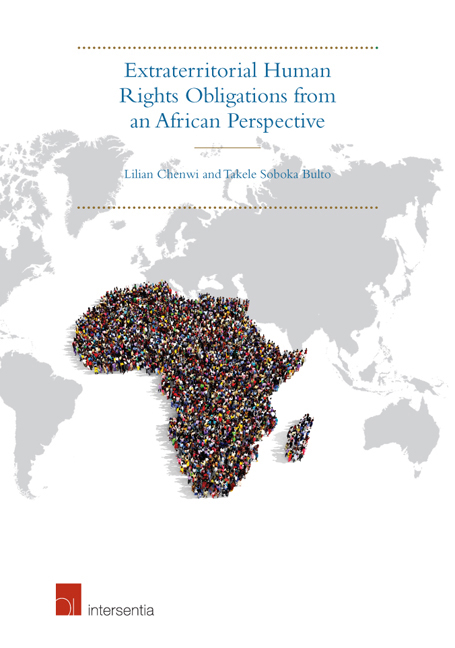Book contents
- Frontmatter
- Dedication
- Foreword
- Preface
- Contents
- List of Cases, Advisory Opinions and Other Decisions
- List of Treaties and Other Instruments
- About the Contributors
- Introduction
- Extraterritoriality in the African Regional Human Rights System from a Comparative Perspective
- Commercialisation of Educational Services and Extraterritorial Human Rights Obligations
- Extraterritorial Human Rights Obligations in the Context of Development Assistance to African States
- The Right to Food Beyond Borders: The Extraterritorial Reach of the Right to Food in Africa
- Extraterritorial Application of the Right to Water under the African System for the Protection of Human Rights
- Tortured Unity: United States–Africa Relations in Extraordinary Renditions and States’ Extraterritorial Obligations
- Indigenous Communities Displaced by Climate Change and Extraterritorial Application of States’ Obligations in Africa
- Land Grabbing, Extraterritorial Obligations and the Failure of Justice in Uganda: The Mubende Case
- Extraterritorial Obligations of Uganda for its Military's Failure to Respect and Protect Civilians in Areas of the Lord's Resistance Army Activity
- Bibliography
- Index
Extraterritorial Application of the Right to Water under the African System for the Protection of Human Rights
Published online by Cambridge University Press: 21 September 2018
- Frontmatter
- Dedication
- Foreword
- Preface
- Contents
- List of Cases, Advisory Opinions and Other Decisions
- List of Treaties and Other Instruments
- About the Contributors
- Introduction
- Extraterritoriality in the African Regional Human Rights System from a Comparative Perspective
- Commercialisation of Educational Services and Extraterritorial Human Rights Obligations
- Extraterritorial Human Rights Obligations in the Context of Development Assistance to African States
- The Right to Food Beyond Borders: The Extraterritorial Reach of the Right to Food in Africa
- Extraterritorial Application of the Right to Water under the African System for the Protection of Human Rights
- Tortured Unity: United States–Africa Relations in Extraordinary Renditions and States’ Extraterritorial Obligations
- Indigenous Communities Displaced by Climate Change and Extraterritorial Application of States’ Obligations in Africa
- Land Grabbing, Extraterritorial Obligations and the Failure of Justice in Uganda: The Mubende Case
- Extraterritorial Obligations of Uganda for its Military's Failure to Respect and Protect Civilians in Areas of the Lord's Resistance Army Activity
- Bibliography
- Index
Summary
INTRODUCTION
The 2010 United Nations (UN) General Assembly and the UN Human Rights Council resolutions recognising a human right to water acknowledge a problem that affects one-third of humanity – close to one billion people are without access to safe water and 2.6 billion are without access to improved sanitation services. At the African level, the African Commission on Human and Peoples’ Rights (African Commission) recently noted in a key resolution that two out of five Africans do not have access to clean drinking water, and that among waterborne diseases, diarrhoea alone accounts for more than 8.8 per cent of mortality on the continent. Goal 6 of the 2030 Agenda for Sustainable Development focuses on water and sanitation to’ ensure availability and sustainable management of water and sanitation for all’. Targets 6.1 and 6.2 build on the Millennium Development Goals (MDGs) targets on drinking water and basic sanitation, providing continuity, while targets 6.3 to 6.6 address the broader water context that was not explicitly included in the MDG framework, such as water quality and wastewater management, water scarcity and wateruse efficiency, integrated water resources management, and the protection and restoration of water-related ecosystems.
Although the UN Committee on Economic, Social and Cultural Rights (CESCR) attempted to elaborate the legal basis, scope and content of the right to water in 2002, the existence of an independent right to water under international law remains the subject of intense debate. The resolutions and general comments adopted by UN bodies are a very significant political step towards the recognition of the right to water. However, from a legal perspective many questions remain as to the legal status of the human right to water under international human rights law.
This chapter argues for viewing human rights in an extraterritorial light, using the human right to water under the African system for the protection of human rights as an entry point. The chapter thus attempts to answer the key question on how states could be more accountable for their foreign policies that impact on the realisation of the right to water in third states, and whether there are remedies that could be put in place for victims of the negative effects of such policies. This chapter is divided into four sections.
- Type
- Chapter
- Information
- Publisher: IntersentiaPrint publication year: 2018



